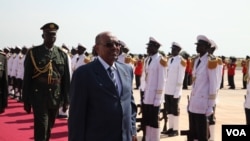UNITED NATIONS —
The top United Nations official for South Sudan, as well as South Sudan’s U.N. representative, are expressing cautious optimism about the months ahead in that country, but they also agree South Sudan faces significant challenges.
In remarks to the United Nations Security Council, the head of the U.N. Mission in South Sudan, Hilde Johnson, said the country is still traveling a bumpy road. But, she added, there are positive indications that it can turn the corner.
Among the issues of concern, she said, is the situation in South Sudan’s volatile Jonglei state. Despite relative stability in recent weeks, what she called “the vicious cycle of retaliatory violence” poses risks to the government’s effort to stabilize the state.
Johnson then pointed to another area of “grave concern,” the performance of South Sudan’s security forces.
“South Sudan continues to face serious challenges in the area of the promotion and protection of human rights. Key issues include prolonged and arbitrary detentions, excessive use of force and arbitrary killings by ill-disciplined security forces and agencies, and individual incidents of interference with the rights to freedom of expression, association and assembly," said Johnson.
In separate remarks, South Sudan U.N. Representative Francis Deng told the Security Council the government is committed to what he described as a policy of zero tolerance for crimes against civilians, especially by the army.
“The government has court martialed those soldiers who committed abuses, and has opened new investigations into abuses. It is my belief that we have responded as fast as was possible in difficult circumstances to the need for justice and accountability," said Deng.
The situation in Jonglei state, Deng said, presents a challenge to the government’s ability to take primary responsibility for the protection of South Sudan’s civilians. South Sudan’s will to remove the obstacles it faces, he concluded, is undiminished.
U.N. official Johnson said South Sudan is at a cross roads and the international community cannot afford to see the world’s newest country fail.
Following a closed-door meeting of the Security Council, the council president, China’s ambassador Liu Jieyi, said there have been positive developments in South Sudan - including the strengthening of the government, signs of economic development and the improvement of the security situation, although, he said, serious challenges remain.
“But the important thing is that the government is taking steps by itself and also in cooperation with the U.N. presence on the ground," said Liu.
Liu said the Security Council supports the U.N. Mission in South Sudan and hopes for closer cooperation between the U.N. mission and Sudan’s government.
In remarks to the United Nations Security Council, the head of the U.N. Mission in South Sudan, Hilde Johnson, said the country is still traveling a bumpy road. But, she added, there are positive indications that it can turn the corner.
Among the issues of concern, she said, is the situation in South Sudan’s volatile Jonglei state. Despite relative stability in recent weeks, what she called “the vicious cycle of retaliatory violence” poses risks to the government’s effort to stabilize the state.
Johnson then pointed to another area of “grave concern,” the performance of South Sudan’s security forces.
“South Sudan continues to face serious challenges in the area of the promotion and protection of human rights. Key issues include prolonged and arbitrary detentions, excessive use of force and arbitrary killings by ill-disciplined security forces and agencies, and individual incidents of interference with the rights to freedom of expression, association and assembly," said Johnson.
In separate remarks, South Sudan U.N. Representative Francis Deng told the Security Council the government is committed to what he described as a policy of zero tolerance for crimes against civilians, especially by the army.
“The government has court martialed those soldiers who committed abuses, and has opened new investigations into abuses. It is my belief that we have responded as fast as was possible in difficult circumstances to the need for justice and accountability," said Deng.
The situation in Jonglei state, Deng said, presents a challenge to the government’s ability to take primary responsibility for the protection of South Sudan’s civilians. South Sudan’s will to remove the obstacles it faces, he concluded, is undiminished.
U.N. official Johnson said South Sudan is at a cross roads and the international community cannot afford to see the world’s newest country fail.
Following a closed-door meeting of the Security Council, the council president, China’s ambassador Liu Jieyi, said there have been positive developments in South Sudan - including the strengthening of the government, signs of economic development and the improvement of the security situation, although, he said, serious challenges remain.
“But the important thing is that the government is taking steps by itself and also in cooperation with the U.N. presence on the ground," said Liu.
Liu said the Security Council supports the U.N. Mission in South Sudan and hopes for closer cooperation between the U.N. mission and Sudan’s government.




